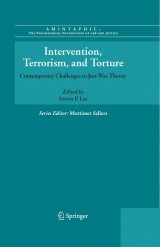Details

Intervention, Terrorism, and Torture
Contemporary Challenges to Just War TheoryAMINTAPHIL: The Philosophical Foundations of Law and Justice, Band 1
|
96,29 € |
|
| Verlag: | Springer |
| Format: | |
| Veröffentl.: | 22.11.2006 |
| ISBN/EAN: | 9781402046780 |
| Sprache: | englisch |
| Anzahl Seiten: | 323 |
Dieses eBook enthält ein Wasserzeichen.
Beschreibungen
<P>Just war theory is the traditional approach taken to questions of the morality of war, but war today is far from traditional. War has been deeply affected in recent years by a variety of social and technological developments in areas such as international terrorism, campaigns of genocide and ethnic cleansing, the global human rights movement, economic globalization, and military technology. This book asks whether just war theory is adequate to the challenges these developments pose. Just war theory provides rules for determining when it is justified to fight a war. But some have argued that the nature of contemporary war makes these rules obsolete. For example, genocidal and aggressive regimes may require the use of military force that is not strictly in self-defense, as just war theory requires. In addition, the theory provides rules for determining what the limits are on justified conduct in war. But the random violence of terrorism and the deliberately inflicted violence of torture seem endemic to our age, yet take us beyond the limits set by these rules of conduct in war. By carefully examining the phenomena of intervention, terrorism, and torture from a number of different perspectives, the essays in this book explore this set of issues with insight and clarity.</P>
Just War Theory and the Challenges It Faces.- Some Theoretical Background.- A Postmodern View of Just War.- From Rights to Realism: Incoherence in Walzer's Conception of Jus in Bello.- A Realist Response to Walzer's Just and Unjust Wars.- Intervention.- Walzer and Rawls on Just Wars and Humanitarian Interventions.- Humanitarian Intervention and Relational Sovereignty.- Just War Theory Post 9/11: Perfect Terrorism and Superpower Defense.- Preventive Intervention.- Terrorism.- Law, Just War, and the International Fight Against Terrorism: Is It War?.- Determining Moral Rectitude in Thwarting Suicide Terrorist Attacks: Moral Terra Incognita.- Terrorism and the Ethics of War.- The War Against Terrorism and the “War“ Against Terrorism.- Terrorism and Universal Jurisdiction.- Torture.- Humanity, Prisoners of War, and Torture.- Assessing the Prohibition Against Torture.- Liberalism, Torture, and the Ticking Bomb.- Torture and Self-Defense.- War Rape's Challenge to Just War Theory.- Prisons, POW Camps, and Interrogation Centers: Reflections on the Juridic Status of Detainees.- The Impact of Technology.- Non-Combatant Immunity in an Age of High Tech Warfare.
<P>Just war theory is the traditional approach taken to questions of the morality of war, but war today is far from traditional. War has been deeply affected in recent years by a variety of social and technological developments in areas such as international terrorism, campaigns of genocide and ethnic cleansing, the global human rights movement, economic globalization, and military technology. This book asks whether just war theory is adequate to the challenges these developments pose. Just war theory provides rules for determining when it is justified to fight a war. But some have argued that the nature of contemporary war makes these rules obsolete. For example, genocidal and aggressive regimes may require the use of military force that is not strictly in self-defense, as just war theory requires. In addition, the theory provides rules for determining what the limits are on justified conduct in war. But the random violence of terrorism and the deliberately inflicted violence of torture seem endemic to our age, yet take us beyond the limits set by these rules of conduct in war. By carefully examining the phenomena of intervention, terrorism, and torture from a number of different perspectives, the essays in this book explore this set of issues with insight and clarity.</P>
Brings the discussion of just war theory up to date, given the changes in contemporary warfare Discusses the extent to which military interventions, both humanitarian (Kosovo) and preventive (Iraq), are morally justified Considers the nature and moral characteristics of terrorism Addresses the question of what our response to terrorism should be and asks what moral limits there are in the "war" on terrorism Examines torture as a method of gathering intelligence about terrorism, asking whether scenarios like the "ticking time bomb" can ever justify it


















